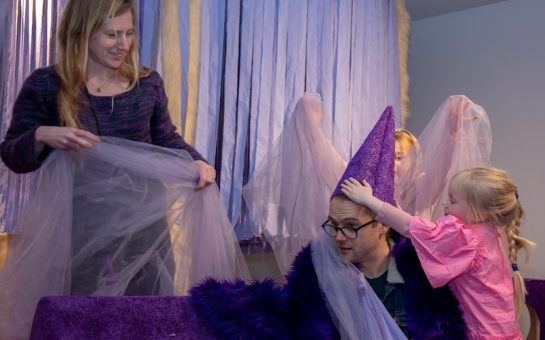By Tom Holmes
March 12 2020, 11.25
Follow @SW_Londoner
Adam Lazarus’s Daughter is a dark, deeply disturbing satire of toxic masculinity, and how men treat women in general, but more specifically their daughters.
It’s a piece that cuts close to the bone, a grim, thinly-veiled series of escalating anecdotes that the audience is laughing along to – until it isn’t.
When I say Daughter won’t be for everyone, I mean it as a compliment, but Daughter really won’t be for everyone.
Mr Lazarus and his co-creators have dug deep into what it means to be a man, and tried to explore how the smaller acts of violence and oppression towards women become bigger ones.
What’s impressive about this piece is that it really does engage the audience and ask them to consider themselves in the figure of the Father.
At the start of the play, you’re actively encouraged to laugh along with the Father as he jokes about certain aspects of fatherhood and how he treats women.
It’s only when the deeply disturbed nature of the character starts to really come out that the audience turns against him, and the play stares at you for a long poignant second before asking: why did it take you so long?
The real brilliance of Daughter is that every man can see parts of himself in the character and every woman can see a man from their lives.
And whilst Daughter draws a line under this character, the way that the character slowly shifts throughout the play has a clear message.
The Father of the first twenty minutes is not the Father of the last ten, and the message is supposed to burn into the audience.
This isn’t a piece born out of hatred of men, and truthfully it would be too easy and uncharitable to the work Mr Lazarus and his team have done to label the character a monster.
What the piece does is challenge men to examine their behaviour, to ask them where on their journey they are and invite them to examine themselves.
Daughter offers the opportunity for audience members to stay after the play is finished and engage in an open and frank discussion about the issues raised.
I did stay and I would highly recommend that you do, because this is a play that speaks to different people in different ways.
Only by listening to what other people thought, felt and took away from it did I truly grasp how interesting and, dare I say, important this piece of art was.
Not only that, but Daughter’s final moments turn the lens of toxic masculinity away from the character, and onto the audience, inviting them to have a real conversation about their own experiences.
Because although I confess that I went along already prepared to agree with the play’s central thesis: that we need to have more open and honest conversations about toxic masculinity, it still remains the case that we absolutely do.
Daughter is a fascinating, deeply disturbing, brutally necessary piece of art, and like all good art, it forces you to stop and think about yourself.
But more than that, it creates an environment and tools for you to try and self-reflect and examine.
And as a result, I would highly recommend it.
Daughter runs until March 28 at Battersea Arts Centre.
You can buy tickets here and read SWL’s interview with Adam Lazarus here.
Feature image credit: John Lauener




